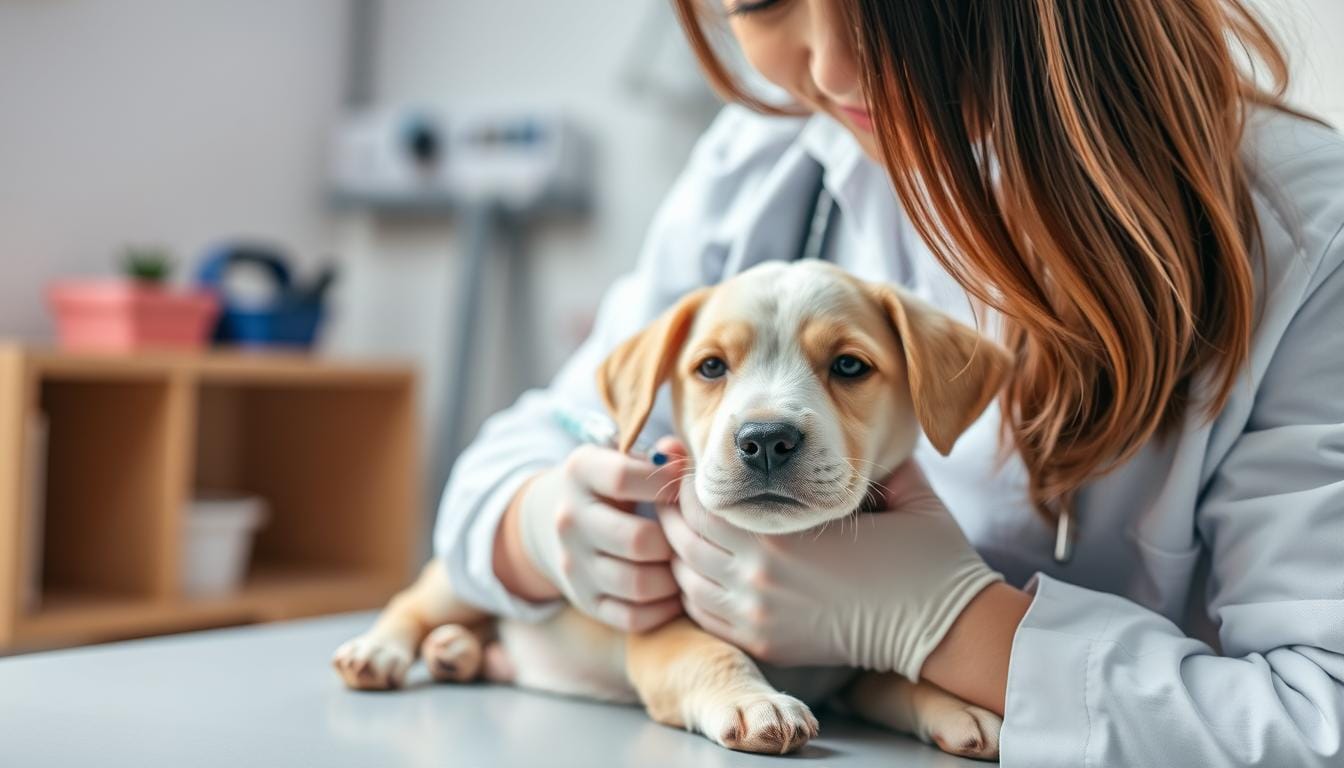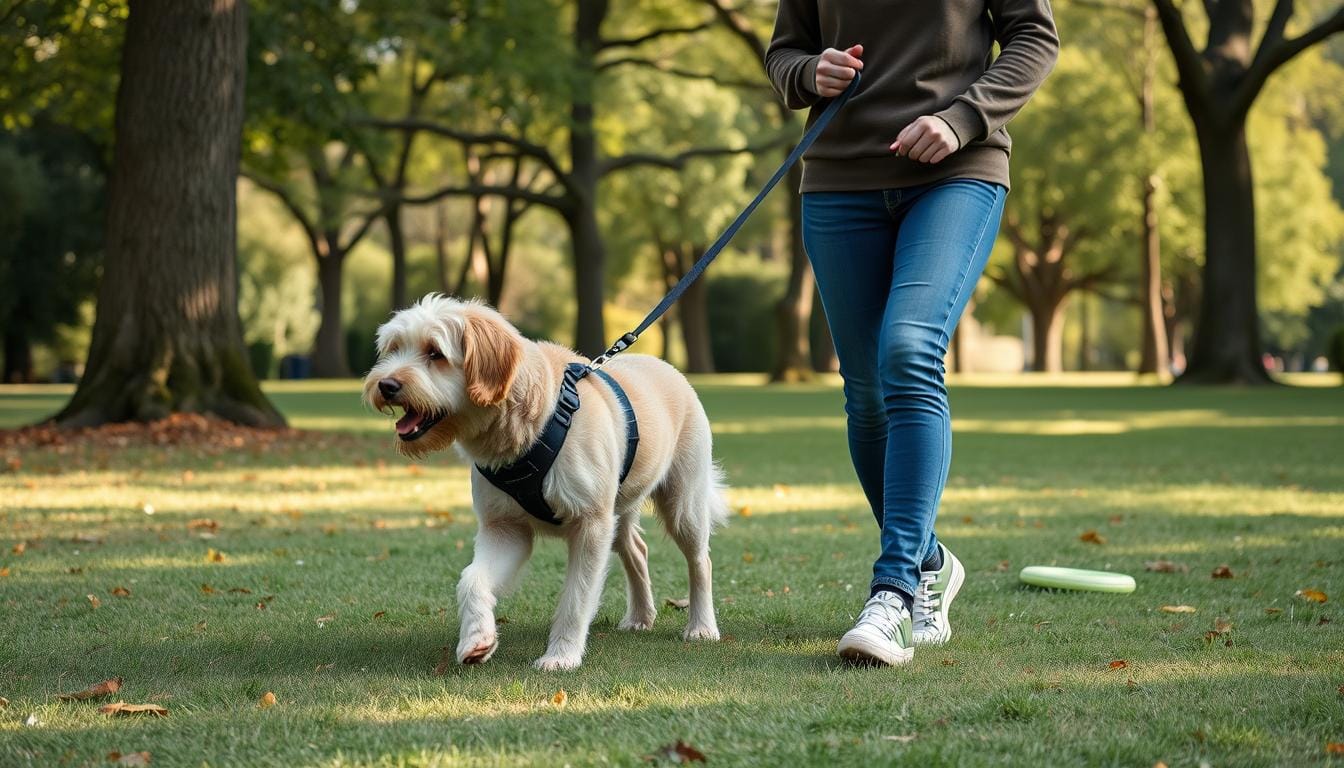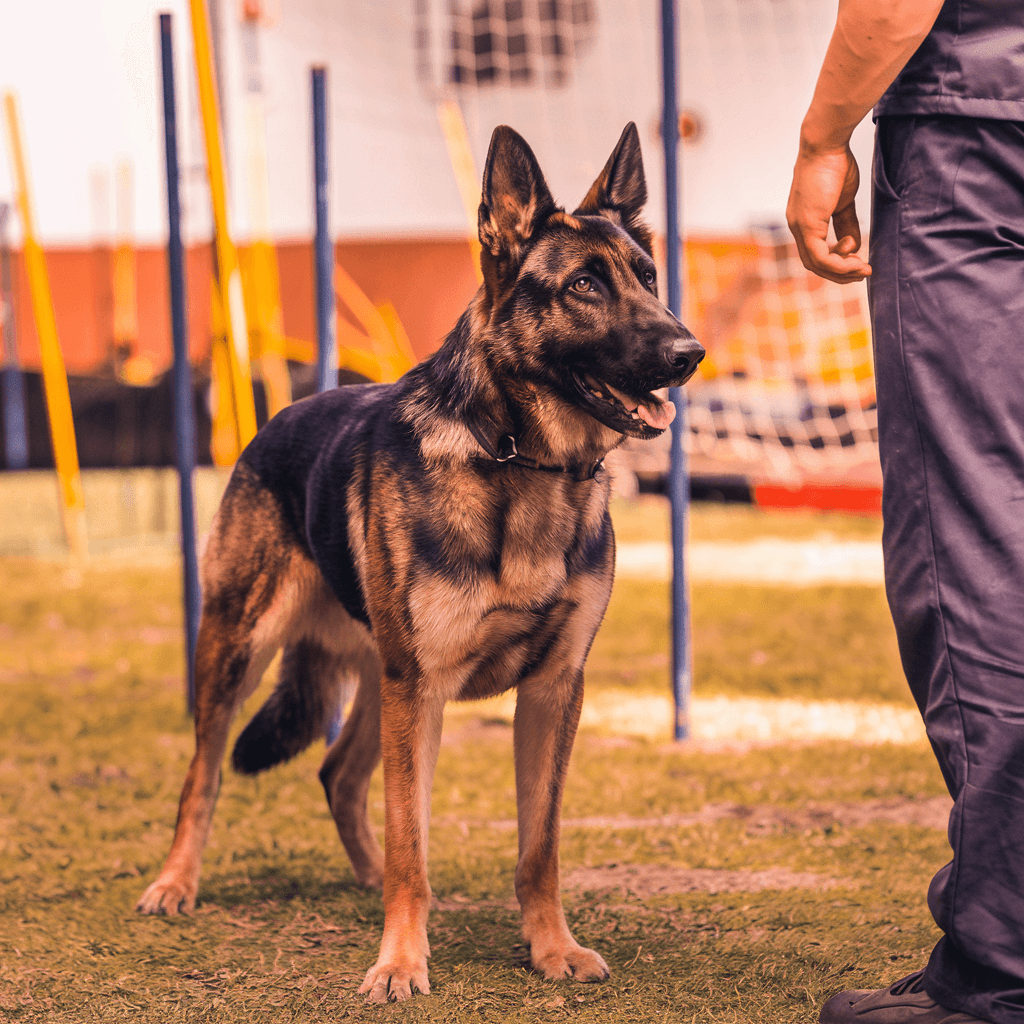Bringing a new puppy home is exciting but comes with big responsibilities. Ensuring they get the right vaccinations is key. Vaccines are crucial for keeping your puppy healthy.
Vets in Oakland and the U.S. say it’s important to follow a vaccination schedule. This guide will cover all you need to know about puppy vaccinations. We’ll talk about their importance, costs, and schedules.
We’ll look at core vaccines every puppy needs and non-core ones based on their lifestyle. You’ll learn about the diseases these vaccines fight. And why they’re so important for your dog’s health.
If you’re new to dog ownership or want to learn more, this guide is for you. It offers clear, easy-to-understand info. Let’s explore puppy vaccinations and help your new friend live a long, healthy life.
Key Takeaways
- Puppy vaccinations are essential for protecting against serious diseases
- The average cost for puppy vaccinations ranges from $75 to $100
- Vaccination schedules typically span the first year of a puppy’s life
- Core vaccines protect against diseases like distemper, parvovirus, and rabies
- Non-core vaccines may be recommended based on lifestyle and local risks
- Regular vaccinations are a key component of long-term dog health
- Consult with a veterinarian to create a tailored vaccination plan for your puppy
Understanding the Importance of Puppy Vaccinations, Dog Health, and Preventive Care
Puppy vaccinations are key to keeping our furry friends safe from harmful diseases. As pet owners, we must focus on dog immunizations to keep our dogs healthy and long-lived.
Why Vaccinations are Essential for Puppy Health
Vaccines protect puppies from serious illnesses. Core vaccines like Rabies and Distemper are crucial. Shots start at 6 to 8 weeks, with more every 3 to 4 weeks.
The Role of Preventive Care in Long-term Dog Health
Canine preventive care is more than just shots. Regular vet visits, blood tests, and good food are essential. Catching health problems early can greatly improve your dog’s life.
Building Immunity Through Proper Vaccination
Vaccines help your puppy’s immune system fight off diseases. This builds strong immunity. Sticking to the vaccination schedule is crucial for the best protection.
| Vaccine Type | Start Age | Frequency |
|---|---|---|
| Core Vaccines | 6-8 weeks | Every 3-4 weeks until 16 weeks |
| Non-Core Vaccines | Based on risk factors | Varies by vaccine |
| Adult Boosters | After 1 year | Annually or as recommended |
By focusing on pet wellness through vaccines and care, we ensure our dogs live happy, healthy lives. Remember, every puppy is different. Talk to your vet to create a care plan that fits your dog’s needs.
Core Vaccines: Essential Protection for Every Puppy
Core vaccines are key to keeping your puppy safe. They protect against serious and deadly diseases. Let’s look at the main vaccines and when they should be given.
DHPP Vaccine Components and Benefits
The DHPP vaccine is vital for your puppy’s health. It guards against four major diseases:
- Distemper: A contagious virus that harms many body parts
- Hepatitis: A liver disease caused by canine adenovirus
- Parvovirus: A severe stomach disease, often deadly in young puppies
- Parainfluenza: A respiratory infection that can cause kennel cough
Rabies Vaccination Requirements
Rabies vaccination is essential for your puppy’s health and is required by law in the U.S. This virus attacks the nervous system and is always fatal. The first rabies shot is given between 12 to 16 weeks of age.
Timeline for Core Vaccine Administration
A good vaccination schedule is crucial for your puppy’s immunity. Here’s a general timeline for core vaccines:
| Age | Vaccines |
|---|---|
| 6-8 weeks | First DHPP |
| 10-12 weeks | Second DHPP |
| 14-16 weeks | Third DHPP, First Rabies |
| 1 year | DHPP booster, Rabies booster |
Regular vet visits are important to keep your puppy on schedule with these vital vaccines. Your vet may adjust the schedule based on your puppy’s needs and local laws.
Remember, these core vaccines are the base of your puppy’s health protection. Keeping up with puppy shots prevents serious diseases and helps your puppy live a long, healthy life.
Non-Core Vaccines: Understanding Optional Protection
Non-core vaccines are key in keeping puppies healthy. They protect against certain diseases based on a puppy’s lifestyle and where they live. Let’s look at some common non-core vaccines and why they matter.
The Bordetella vaccine fights kennel cough, a contagious respiratory disease. It’s needed for puppies going to daycare, boarding, or group classes. The shot is given every 6-12 months, depending on the puppy’s risk.
The Leptospirosis vaccine protects against a bacterial infection that affects dogs and humans. It’s suggested for puppies that go outside a lot or live in high-risk areas. The first shot is given at 12 weeks, followed by a booster 2-4 weeks later, and then yearly.
The Lyme disease vaccine is good for puppies in areas with ticks carrying Borrelia burgdorferi bacteria. It can be given to dogs as young as eight weeks. This vaccine is crucial for pups playing in wooded areas or tall grass.
The Canine Influenza vaccine guards against dog flu. It’s given around 6 months of age, with a booster two weeks later, and yearly shots after that. This vaccine is recommended for puppies in areas with dog flu outbreaks or those often around other dogs.
“Non-core vaccines are tailored to your puppy’s unique needs, enhancing their overall health protection.”
Remember, talking to your vet is important when deciding on non-core vaccines. They’ll look at your puppy’s risk factors and create a vaccination plan. This ensures your puppy stays healthy and gets the best preventive care.
Complete Puppy Vaccination Schedule: Birth to One Year
Keeping your puppy healthy with the right vaccinations is key. We’ve put together a detailed puppy vaccination schedule for their first year.
Early Puppy Shots (6-8 Weeks)
Puppies usually get their first DHPP vaccine at this age. This shot protects against distemper, hepatitis, parvovirus, and parainfluenza. Your vet might also suggest the Bordetella vaccine for social puppies.
Middle-Stage Vaccinations (10-12 Weeks)
At this point, your puppy needs a DHPP booster. Your vet might also recommend Leptospirosis, Lyme disease, or Canine Influenza vaccines based on your area and lifestyle.
Final Puppy Vaccines (16-18 Weeks)
The final vaccinations include another DHPP booster and the rabies vaccine. Some vets prefer to give the final DHPP at 16 weeks or later for better protection.
| Age | Core Vaccines | Optional Vaccines |
|---|---|---|
| 6-8 Weeks | DHPP | Bordetella |
| 10-12 Weeks | DHPP | Leptospirosis, Lyme, Influenza |
| 16-18 Weeks | DHPP, Rabies | Leptospirosis, Lyme, Influenza |
This schedule is just a guide. Your vet will tailor a vaccination plan for your puppy. Regular vet visits and sticking to this schedule are crucial for your dog’s health.

Common Diseases Prevented by Vaccinations
Canine vaccines are key in keeping puppies and dogs healthy. They shield our pets from many contagious and dangerous diseases. Let’s look at the viral, bacterial, and zoonotic illnesses that vaccines can prevent.
Viral Infections and Their Symptoms
Viral diseases are a big risk for puppies. Distemper can cause serious brain problems and pneumonia. Parvovirus leads to severe stomach issues. Canine hepatitis can damage the liver, and rabies is always fatal if not vaccinated.
Bacterial Diseases in Puppies
Bacterial infections are also a threat to puppies. Kennel cough, caused by Bordetella, is common in dogs that socialize a lot. Leptospirosis can harm the kidneys and liver. Vaccines help protect against these diseases.
Zoonotic Disease Prevention
Some diseases, like rabies and leptospirosis, can spread from animals to people. Vaccines protect our pets and keep us safe by stopping these diseases from spreading.
| Disease | Type | Symptoms | Vaccination Schedule |
|---|---|---|---|
| Distemper | Viral | Neurological signs, pneumonia | Core vaccine, every 3 years |
| Parvovirus | Viral | Severe gastrointestinal issues | Core vaccine, every 3 years |
| Rabies | Viral (Zoonotic) | Fatal neurological disease | Core vaccine, annually or triennially |
| Bordetella | Bacterial | Kennel cough | Non-core vaccine, annually |
| Leptospirosis | Bacterial (Zoonotic) | Kidney/liver failure | Non-core vaccine, annually |
Understanding Vaccine Costs and Investment

Getting your puppy vaccinated is key to their health. The cost can vary by location and vet. But, it’s worth it for your pet’s well-being.
Core vaccines like DHPP cost about $25 each. Rabies shots are $15 to $20. Non-core vaccines are less than $100. Remember, puppies need several visits for their first shots, which can add up.
| Vaccine Type | Average Cost | Frequency |
|---|---|---|
| DHPP (Core) | $25 | Every 2-4 weeks until 16 weeks old |
| Rabies (Core) | $15-$20 | Initially, then every 3 years |
| Non-core vaccines | Under $100 | Varies based on individual needs |
Many vets offer deals for puppy shots. These packages include essential vaccinations and health checks. They’re a good deal for new pet owners.
The first costs might seem steep. But, adult dogs need fewer shots, making costs lower over time. They might only need boosters every 1-3 years.
“Vaccinating your pet is a cost-effective way to prevent serious and potentially life-threatening diseases.”
Regular vaccinations and health checks do more than just protect your puppy. They ensure a long, happy life for your dog.
Potential Side Effects and Safety Considerations
Dog immunizations are key for puppy health. It’s vital to know about possible side effects. Most puppies have little to no reaction, but knowing what to expect helps you care for them better.
Normal Vaccine Reactions
After getting shots, puppies might feel a bit off. These feelings usually go away in 24-48 hours. They might have:
- Slight soreness at the injection site
- Mild fever
- Decreased appetite
- Low energy levels
These signs are usually okay. They mean your puppy’s body is reacting to the vaccine.
When to Contact Your Veterinarian
But, some puppies might have bigger problems. Call your vet right away if you see:
- Severe lethargy
- Persistent vomiting or diarrhea
- Facial swelling
- Difficulty breathing
- Seizures
Managing Post-Vaccination Care
To keep your puppy healthy after shots:
- Give them a quiet, comfy place to rest
- Watch for any odd signs
- Make sure they have fresh water and their usual food
- Keep them from doing too much for 24-48 hours
Remember, lots of puppies get shots every year without problems. By staying informed and watching closely, you can make sure your puppy’s vaccination experience goes smoothly.
Adult Dog Booster Schedules and Maintenance
Keeping up with your adult dog’s vaccination schedule is key to their health. As they grow, their immune system needs regular boosters. This helps protect them from many diseases. Let’s explore how adult dog vaccinations keep them healthy for years to come.
Core vaccines, like DHPP (Distemper, Hepatitis, Parvovirus, and Parainfluenza), are vital. They are given every three years after the puppy series. Rabies vaccines may need to be given annually or every three years, depending on local laws and the vaccine type.
Non-core vaccines, like Bordetella (kennel cough), need annual boosters. Your vet will make a vaccination plan for your dog. This plan considers their lifestyle, health, and risk of exposure.
| Vaccine | Frequency | Notes |
|---|---|---|
| DHPP | Every 3 years | Core vaccine for all dogs |
| Rabies | Every 1-3 years | Legally required in most states |
| Bordetella | Annually | Recommended for social dogs |
| Leptospirosis | Annually | Based on risk factors |
Regular check-ups are crucial for your dog’s health and vaccination updates. By keeping up with preventive care, you’re ensuring your pet’s long-term happiness and health.
Regional Considerations for Vaccination Protocols
Vaccination plans for pets aren’t the same everywhere. Where you live and how your pet lives affect their vaccine needs.
Geographic Risk Factors
Dogs face different health risks in different places. For example, Lyme disease is common in the Northeast and upper Midwest. Dogs there might need extra protection against it.
Lifestyle-Based Vaccination Needs
What your dog does every day affects their vaccine needs. Dogs that go to dog parks, daycare, or boarding might need more shots. This is to protect them from diseases like Bordetella.
Here’s a quick breakdown of lifestyle factors and their associated vaccines:
| Lifestyle Factor | Recommended Vaccine |
|---|---|
| Frequent boarding | Bordetella, Canine Influenza |
| Outdoor adventures | Leptospirosis, Lyme Disease |
| Dog shows/competitions | Canine Influenza, Parainfluenza |
These are just general tips. Always talk to your vet for the best plan for your pet. They can make a vaccine plan that fits your dog’s needs and risks.
Conclusion
Puppy vaccinations are key to keeping our pets safe from serious diseases. By sticking to a vaccination schedule, we build a strong base for their health. Regular check-ups and booster shots keep them protected, making sure they stay well and joyful.
We’ve looked at why core and non-core vaccines are important. Each vaccine, like DHPP and rabies, helps protect your puppy. Remember, taking care of your pet is more than just shots. It’s also about good food, exercise, and vet visits.
As pet owners, we need to know how to choose the right vaccines for our pets. Working with vets and keeping up with new advice helps us give our dogs the best care. Let’s use this knowledge to give our puppies a healthy start in life.
















